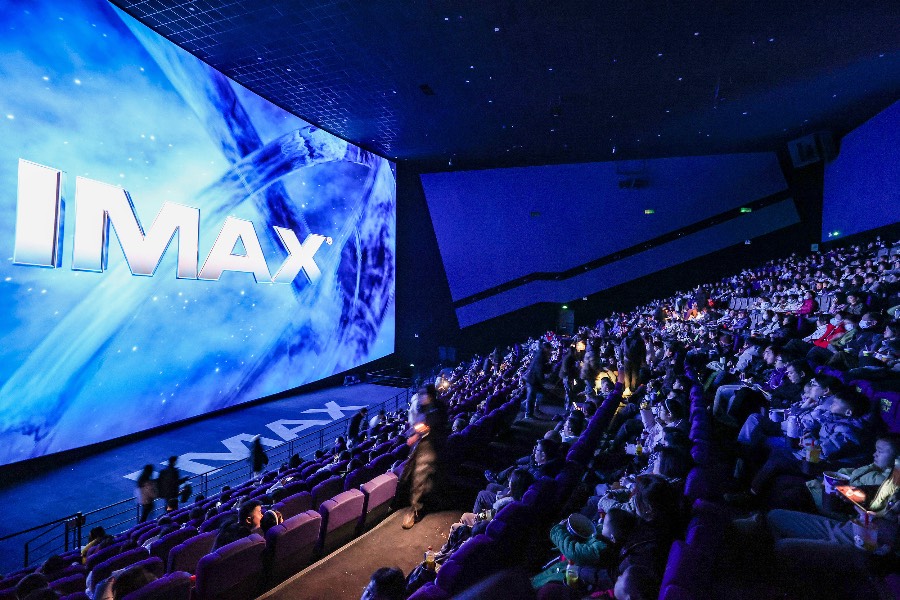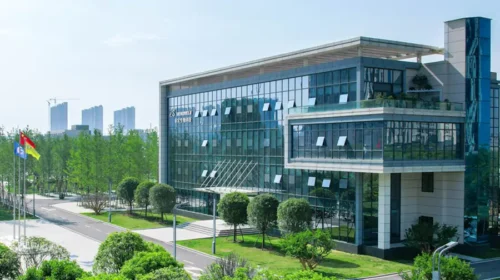China’s fading box office delivers rare profit-booster for Imax China

After a lackluster performance last year, the big-screen movie company returned to profit growth in the first half of 2025 on the back of box office blockbuster ‘Ne Zha 2’
Key Takeaways:
- Imax China reported its profit surged nearly 90% in the first half of the year, as its revenue rose 32%
- The big-screen movie company’s revenue associated with content solutions more than doubled during the six-month period
By Lau Chi Hang
There’s nothing like a mega-blockbuster to revive an otherwise lackluster movie market.
China found such a hit in “Ne Zha 2,” the animated story of a devil child based on local folklore, which supplied half of all ticket sales in the first half of this year for the world’s largest box office that was otherwise slumping. The hit also turbocharged business for Imax China Holding Inc. (1970.HK), whose revenue jumped 32% year-on-year to $57.8 million in the first half of 2025, as its profit surged 89% to $23.89 million, according to its midyear financial report.
Investors held out high hopes for Imax China when it listed in Hong Kong in 2015, betting the Chinese offshoot of Canada’s Imax(IMAX.N) was well placed to profit from a box office that was booming at the time. Investors believed that growing demand from increasingly discerning Chinese would further fuel demand for Imax’s premium big-screen viewing experience. Such hopes sent the stock from its listing price of HK$31 to as much as HK$60.
But reality quickly caught up with the company as China’s box office ran out of steam and even contracted during the pandemic when many theaters were closed and people avoided cinemas over fears of infection. The company’s stock bore the brunt of that slowdown, dropping as low as HK$5.70 last April, down more than 90% from its headiest days.
The company’s profit fell almost 20% last year as theaters suffered from lack of big hits and an economic slowdown that left consumers spending less. But just when the market was losing hope for the company, its fortunes revived this year. In addition to the “Ne Zha” boost, Imax China’s revenue from content solutions was another bright spot. That revenue stream sees Imax China convert movies to its format, and then take a cut of the box office under profit-sharing arrangements with theaters.
This business delivered $20.8 million in revenue in the first half of the year, up 123%, which was in no small part due to profit-sharing derived from “Ne Zha.” The movie raked in 15.45 billion yuan, setting a box-office record for China and also the Imax category.
The company’s other main business line involves providing clients with technology products and related services, which also got a boost in the first half of 2025 under profit-sharing arrangements and on higher maintenance fees. But gains for that segment were much more muted, up only 6.3% year-on-year to $36.23 million.
In the final credits, it’s quite fair to say that Imax’s stellar performance in the first half of the year was a bit of a one-hit wonder. The company’s stock rose as much as 3% the day after the results came out, though the nature of its upbeat report may leave room for doubts about whether the uptick is sustainable.
Lackluster box office
After a decade of breakneck growth in the 2010s, China box office has plateaued in recent years and is even showing signs of decline. “Ne Zha 2” helped to reinvigorate ticket sales at the start of this year, but such films probably only come once in a decade, and are the exception rather than the norm.
In fact, China’s annual box office has come in consistently below the 60 billion yuan mark after peaking at 64.1 billion yuan in 2019. The highest post-pandemic reading came in 2023, when the figure totaled 54.9 billion yuan, up 17% from 2022, driven by pent-up demand as the country reopened after three years of lockdowns. But just one year later, revenue fell back to 42.5 billion yuan, retreating 22.6% year-on-year.
According to China Film Administration data, the Chinese movie industry logged box office revenue of 29.2 billion yuan in the first half of 2025, up 23% year-on-year. But 15.4 billion yuan of that came from “Ne Zha 2,” meaning the first-half figure would have been just 19 billion yuan excluding the hit, well below the 23.9 billion yuan in the first half of last year.
Cautious consumers
Imax movies typically charge higher ticket prices than ordinary 2D films due to their higher technical standards and use of special equipment. In China’s largest cities, a ticket to an Imax film can cost about 60 yuan, around 8 yuan to 10 yuan more than average movies and up to 40% more expensive than tickets offered under a wide range of promotions. Such Imax tickets are even more expensive in smaller third- and fourth-tier cities, costing up to 100 yuan or more.
Those higher prices mean Chinese consumers often think twice before making a purchase – a factor that’s becoming especially acute in the country’s economic slowdown as consumers cut back on their discretionary spending. That’s casting a cloud over Imax China’s outlook for the rest of the year, even as it basks in the afterglow of the “Ne Zha” effect.
Genre reliance
Known for its high-resolution and three-dimensional qualities, Imax is particularly suited to certain movie genres. Generally speaking, it adapts well to sci-fi, action and animated movies by making them more attractive with its big-screen effects. By comparison, literary movies, romances and comedies have less potential, and are rarely converted to the format.
That adds a volatility factor to Imax China’s revenue from season to season. In years with strong slates of sci-fi, action and animated movies, the company tends to do well. But that reliance also means Imax China’s fate, to a large extent, is beyond its own control. This year is a case in point. Among all the Imax movies screened in the Greater China region so far this year, only 10 came from Hollywood, compared with 16 during in the same period of 2024. Without “Ne Zha,” a domestic title, China’s box office, and Imax China’s business, would be telling a completely different story for the first half of the year.
“My destiny is for me to control, not the heavens” is one of the best-known lines from “Ne Zha 2.” But the opposite is true for Imax China. Its destiny is by no means under its own control, but instead hinges on the broader movie market, and which genres are most in vogue.
To subscribe to Bamboo Works weekly free newsletter, click here





